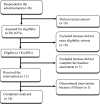Efficacy and acceptability of a pilot dietary intervention focusing on self-compassion, goal-setting and self-monitoring
- PMID: 32517844
- PMCID: PMC10200632
- DOI: 10.1017/S1368980020000658
Efficacy and acceptability of a pilot dietary intervention focusing on self-compassion, goal-setting and self-monitoring
Abstract
Objective: Overweight and obesity are universal health challenges. Recent evidence emphasises the potential benefits of addressing psychological factors associated with obesity in dietary programmes. This pilot study investigated the efficacy and acceptability of a combined online and face-to-face dietary intervention that used self-compassion, goal-setting and self-monitoring to improve dietary behaviour, as well as psychological factors associated with dietary behaviour.
Design: Embedded mixed methods including a 4-week before-after trial and a one-on-one interview. Quantitative outcomes of the study were the levels of self-compassion; eating pathology; depression, anxiety and stress; and dietary intake. Qualitative outcomes were participants' perceptions about the acceptability of the intervention.
Setting: UNSW Kensington campus.
Participants: Fourteen participants with overweight and obesity aged between 18 and 55 years old.
Results: Results showed that the intervention significantly improved self-compassion and some aspects of dietary intake (e.g. decrease in energy intake) at Week Four compared with Week Zero. Some aspects of eating pathology also significantly decreased (e.g. Eating Concern). However, changes in self-compassion over the 4 weeks did not significantly predict Week Four study outcomes, except for level of stress. Most participants found self-compassion, goal-setting and self-monitoring to be essential for dietary behaviour change. However, participants also indicated that an online programme needed to be efficient, simple and interactive.
Conclusions: In conclusion, the current study provides preliminary but promising findings of an effective and acceptable combined online and face-to-face intervention that used self-compassion, goal-setting and self-monitoring to improve dietary habits. However, the results need to be examined in future long-term randomised controlled trials.
Keywords: Eating behaviour; Goal-setting; Obesity; Online; Self-compassion; Self-monitoring.
Similar articles
-
Group-Based Compassion-Focused Therapy as an Adjunct to Outpatient Treatment for Eating Disorders: A Pilot Randomized Controlled Trial.Clin Psychol Psychother. 2017 Mar;24(2):475-487. doi: 10.1002/cpp.2018. Epub 2016 May 30. Clin Psychol Psychother. 2017. PMID: 27237928 Clinical Trial.
-
Online Compassion Focused Therapy for overeating: Feasibility and acceptability pilot study.Int J Eat Disord. 2024 Feb;57(2):410-422. doi: 10.1002/eat.24118. Epub 2023 Dec 21. Int J Eat Disord. 2024. PMID: 38124655
-
Mindfulness as a complementary intervention in the treatment of overweight and obesity in primary health care: study protocol for a randomised controlled trial.Trials. 2018 May 11;19(1):277. doi: 10.1186/s13063-018-2639-y. Trials. 2018. PMID: 29751819 Free PMC article.
-
Single online self-compassion writing intervention reduces anxiety: With the feedback of ChatGPT.Internet Interv. 2025 Feb 8;39:100810. doi: 10.1016/j.invent.2025.100810. eCollection 2025 Mar. Internet Interv. 2025. PMID: 40161471 Free PMC article. Review.
-
Compassion in Autism Services: A Preliminary Framework for Applied Behavior Analysis.Behav Anal Pract. 2023 Jun 13;16(4):1034-1046. doi: 10.1007/s40617-023-00816-x. eCollection 2023 Dec. Behav Anal Pract. 2023. PMID: 38076740 Free PMC article. Review.
Cited by
-
Does self-compassion help to deal with dietary lapses among overweight and obese adults who pursue weight-loss goals?Br J Health Psychol. 2021 Sep;26(3):767-788. doi: 10.1111/bjhp.12499. Epub 2020 Dec 24. Br J Health Psychol. 2021. PMID: 33368932 Free PMC article.
-
Nutrition-Related Mobile Application for Daily Dietary Self-Monitoring.J Nutr Metab. 2022 Aug 30;2022:2476367. doi: 10.1155/2022/2476367. eCollection 2022. J Nutr Metab. 2022. PMID: 36082357 Free PMC article. Review.
-
Promoting safer gambling through social norms and goal setting: A qualitative process analysis of participants' experiences in the EROGamb 2.0 feasibility trial.Internet Interv. 2024 Nov 20;38:100790. doi: 10.1016/j.invent.2024.100790. eCollection 2024 Dec. Internet Interv. 2024. PMID: 39764431 Free PMC article.
-
The effect of Virtual Reality Cycling with Music on simple obesity in college students: evidence from a randomized controlled trial in China.Front Public Health. 2024 Nov 21;12:1466142. doi: 10.3389/fpubh.2024.1466142. eCollection 2024. Front Public Health. 2024. PMID: 39639896 Free PMC article. Clinical Trial.
-
A pilot and feasibility study of a randomized clinical trial testing a self-compassion intervention aimed to increase physical activity behaviour among people with prediabetes.Pilot Feasibility Stud. 2022 May 27;8(1):111. doi: 10.1186/s40814-022-01072-6. Pilot Feasibility Stud. 2022. PMID: 35624519 Free PMC article.
References
-
- World Health Organization (2000) Obesity: Preventing and Managing the Global Epidemic. Geneva: World Health Organization. - PubMed
-
- Adams KF, Schatzkin A, Harris TB et al. (2006) Overweight, obesity, and mortality in a large prospective cohort of persons 50 to 71 years old. N Engl J Med 355, 763–778. - PubMed
-
- Avila C, Holloway AC, Hahn MK et al. (2015) An overview of links between obesity and mental health. Curr Obes Rep 4, 303–310. - PubMed
Publication types
MeSH terms
LinkOut - more resources
Full Text Sources


